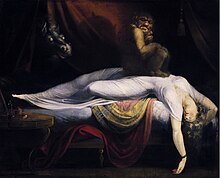User:Mr. Ibrahem/Sleep paralysis
| Mr. Ibrahem/Sleep paralysis | |
|---|---|
 | |
| The Nightmare by Henry Fuseli (1781) is thought to be a depiction of sleep paralysis perceived as a demonic visitation. | |
| Specialty | Sleep medicine |
| Symptoms | Awareness but inability to move during waking or falling asleep[1][2] |
| Duration | Less than a couple of minutes[2] |
| Risk factors | Narcolepsy, obstructive sleep apnea, alcohol use, sleep deprivation[1][2] |
| Diagnostic method | Based on description[2] |
| Differential diagnosis | Narcolepsy, atonic seizure, hypokalemic periodic paralysis, night terror[1][2] |
| Treatment | Reassurance, sleep hygiene, cognitive behavioral therapy, antidepressants[1] |
| Frequency | 8–50%[2] |
Sleep paralysis is a state, during waking up or falling asleep, in which a person is aware but unable to move or speak.[1][2] During an episode, one may hallucinate (hear, feel, or see things that are not there), which often results in fear.[1] Episodes generally last less than a couple of minutes.[2] It may occur as a single episode or be recurrent.[1]
The condition may occur in those who are otherwise healthy or those with narcolepsy, or it may run in families as a result of specific genetic changes.[2] The condition can be triggered by sleep deprivation, psychological stress, or abnormal sleep cycles.[2] The underlying mechanism is believed to involve a dysfunction in REM sleep.[2] Diagnosis is based on a person's description.[2] Other conditions that can present similarly include narcolepsy, atonic seizure, and hypokalemic periodic paralysis.[2]
Treatment options for sleep paralysis have been poorly studied.[1] It is recommended that people be reassured that the condition is common and generally not serious.[1] Other efforts that may be tried include sleep hygiene, cognitive behavioral therapy, and antidepressants.[1]
Between 8% and 50% of people experience sleep paralysis at some point in their life.[2][3] About 5% of people have regular episodes.[2] Males and females are affected equally.[2] Sleep paralysis has been described throughout history.[1] It is believed to have played a role in the creation of stories about alien abduction and other paranormal events.[1]
References[edit]
- ^ a b c d e f g h i j k l Sharpless, BA (2016). "A clinician's guide to recurrent isolated sleep paralysis". Neuropsychiatric Disease and Treatment. 12: 1761–67. doi:10.2147/NDT.S100307. PMC 4958367. PMID 27486325.
{{cite journal}}: CS1 maint: unflagged free DOI (link) - ^ a b c d e f g h i j k l m n o p Avidan, Alon Y.; Zee, Phyllis C. (2011). Handbook of Sleep Medicine (2 ed.). Lippincott Williams & Wilkins. p. Chapter 5. ISBN 9781451153859. Archived from the original on 2020-06-30. Retrieved 2020-07-19.
- ^ Sharpless, Brian A.; Barber, Jacques P. (October 2011). "Lifetime prevalence rates of sleep paralysis: A systematic review". Sleep Medicine Reviews. 15 (5): 311–315. doi:10.1016/j.smrv.2011.01.007. PMC 3156892. PMID 21571556.
